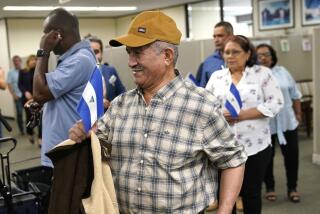Judge, Rebuffing Defense Ploy, Denies Bond for Noriega : Drugs: The ex-dictator claims to be a prisoner of war. But the prosecution argues successfully that setting bail would risk his fleeing the country.
- Share via
MIAMI — Deposed Panamanian dictator Manuel A. Noriega, dressed in his khaki military uniform, declared through his lawyer Friday that he is a prisoner of war in the United States and asked President Bush to place him in custody in a neutral country.
But U.S. District Judge William M. Hoeveler brushed aside Noriega’s claim as “inappropriate” because it was raised at a bond hearing, and he ordered the general held without bond after prosecutors said they feared he would flee the country.
Hoeveler heaped sarcasm on the prisoner-of-war arguments advanced by Noriega attorney Frank A. Rubino, but the judge said he would allow federal prosecutors to file a written response before issuing a formal decision on the matter.
Meanwhile, associate prosecutor Myles H. Malman divulged details of what he called Noriega’s “vast overseas wealth.”
He said records discovered last month by U.S. military authorities in Noriega’s homes and offices in Panama showed that the accused drug trafficker had transferred $19 million to a secret bank account in Luxembourg eight days after he was indicted in Miami in February, 1988.
“We say he is a flight risk and has substantial ties to other countries,” Malman said.
While Noriega’s ties to Cuba’s Fidel Castro have been well known for years, Malman said that the Panamanian dictator also had visited Libyan leader Moammar Kadafi. He introduced into evidence a photograph of the two men together.
“I’m informed that he was the recipient of his-and-hers Kadafi watches,” the prosecutor told the court. “They bear Kadafi’s likeness on them.”
Rubino objected to the reference as “silly and inane,” charging that “it was meant to be demeaning and inflammatory.”
Judge Hoeveler, however, said he considered it noteworthy that Rubino did not dispute Malman’s description of Noriega as “a man of extraordinary wealth.”
While revealing some evidence of Noriega’s holdings, including a letter to a banker in which Noriega referred to a $400,000 condominium he owns in Paris, prosecutors did not estimate the general’s net worth. Some authorities have placed his wealth at $300 million.
When Noriega was arraigned on 11 drug conspiracy charges before Hoeveler on Jan. 4--after his surrender to U.S. authorities in Panama--his lawyers did not ask for a bond hearing because they challenged Hoeveler’s jurisdiction to preside over the trial of a former head of state. They repeated those challenges Friday.
The bond hearing was held at the request of prosecutors, who said they want to avoid problems with possible appeals later.
Rubino opened the hearing by advancing arguments that Hoeveler must relinquish the case to an international tribunal because Noriega is a prisoner of war.
He said a letter from Noriega making this claim was delivered to the White House on Friday.
“It is well accepted that individuals who enjoy the status of prisoner of war are generally immune from prosecution for legitimate acts of war in international armed conflicts,” Rubino’s brief said.
He noted that under the Geneva Convention, Noriega “demands that the United States of America transfer him out of their custody to the custody of a willing third country.”
After concluding his argument, Rubino told the judge, “We respectfully refuse to participate further at this time.”
Hoeveler said the issue is inappropriate because the government must have an opportunity to respond to the request in writing.
The judge then declared, in a voice dripping with sarcasm, “I was going to ask Mr. Rubino a question--but he has escaped my jurisdiction momentarily.
“Certainly I will await the response of the government . . . and the secretary of state as well,” Hoeveler concluded, provoking laughter in the courtroom.
In a statement released late Friday afternoon, the White House said it will respond to Noriega’s letter in court.
“This issue of prisoner-of-war status is currently being litigated,” the White House said. “Our response to the Noriega letter will be made in the court proceedings. However, this request will not affect our ability to prosecute Noriega.”
To back up his remarks about Noriega’s wealth, Malman submitted photographs showing what Malman characterized as “Mr. Noriega’s offices, with lavish furnishings, ivory statuary and the like.”
While the general earned an official government salary of about $50,000 annually, Malman said two envelopes containing $5.8 million in cash were found among his possessions. He said the envelopes were marked “Confidential--for My General Noriega.”
Times staff writer James Gerstenzang, in Washington, contributed to this report.
More to Read
Sign up for Essential California
The most important California stories and recommendations in your inbox every morning.
You may occasionally receive promotional content from the Los Angeles Times.









